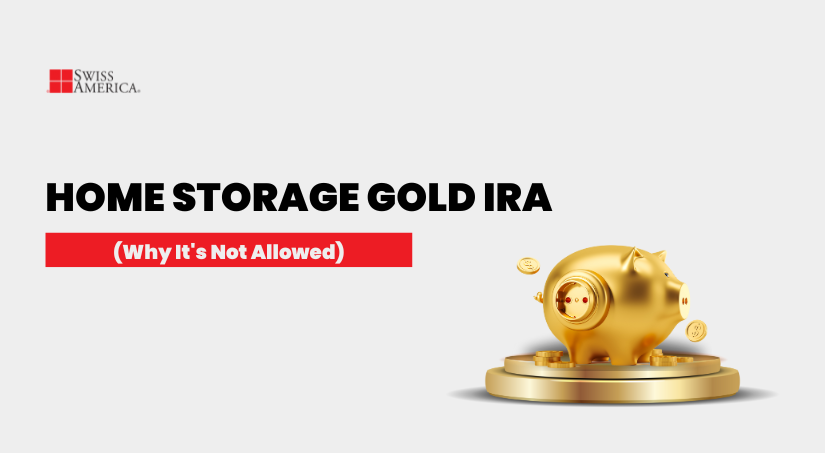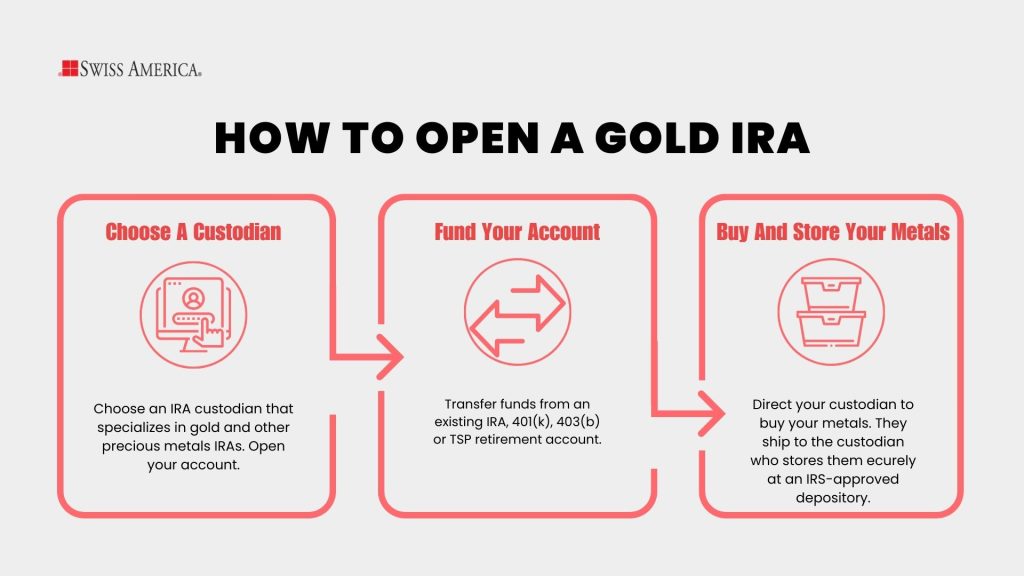
Some people may think a home storage Gold IRA is a good idea. It’s not, and the IRS has strict rules that could turn this “convenience” into a costly mistake. Before you think about keeping your metals in a home storage Gold IRA, learn why following the right regulations is a much better plan.
Keeping your IRA gold safe at home might feel like the ultimate security blanket and penny-pinching idea, but that move could end up costing you more in the long run. While the convenience and peace of mind of a home storage Gold IRA sounds appealing, the IRS has strict regulations that could turn this seemingly simple choice into a financial disaster.
We cover the risks and penalties associated with home storage Gold IRAs and debunk common myths. You’ll also learn how to protect your savings by understanding the correct storage regulations and see what you’re missing out on by not having your gold in an IRA.
Can I set up a home gold storage IRA?
The short answer is no.
Setting up a home gold storage IRA is theoretically possible, but it involves navigating extremely complex requirements that make it impractical for most investors. The IRS has strict conditions that you have to meet, including:
Establish an LLC: First, you must create a Limited Liability Company (LLC) registered in your name to hold the IRA assets.
Financial resources: The IRS requires that you have substantial financial resources to support the LLC and its operations. You’ll need a minimum net worth of at least $250,000 after incorporation and audits.
Corporate insurance: Your LLC must carry corporate insurance to protect against potential liabilities, usually a $250,000 fidelity bond for all employees and trustees.
Public business location: The LLC must operate from a business location that is open to the public, not from a private residence.
Experience in retirement funds: You must have experience managing retirement funds, demonstrating that you can handle the responsibilities of a self-directed IRA.
Regular audits: The LLC and its activities will be subject to regular audits to ensure compliance with IRS regulations.
These requirements make setting up a home gold storage retirement account difficult, to say the least, often more trouble than it’s worth. For 99% of investors, these hurdles are too significant, making it advisable to use an IRS-approved depository instead.
The common myth that you can store IRA gold at home
Many people are drawn to a home storage IRA for their gold, thinking it offers greater convenience and security. Some companies even advertise for “Home Storage Gold IRAs” and offer you a free safe to sign up. These ads are misleading.
You can own all the gold and precious metals you want and store them all at home. That is allowed. But you cannot claim that gold or those precious metals as part of an IRA to get its benefits.
The IRS discourages home storage Gold IRAs
Here it is, straight from the IRS website:
If my IRA invests in gold or other bullion, can I store the bullion in my home?
“Gold and other bullion are “collectibles” under the IRA statutes, and the law discourages the holding of collectibles in IRAs. There is an exception for certain highly refined bullion provided it is in the physical possession of a bank or an IRS-approved nonbank trustee. This rule also applies to an indirect acquisition, such as having an IRA-owned Limited Liability Company (LLC) buy the bullion. IRA investments in other unconventional assets, such as closely held companies and real estate, run the risk of disqualifying the IRA because of the prohibited transaction rules against self-dealing.”
Additionally, section 408(m) of the IRS code states these assets must be “in the physical possession of a trustee.” This section also clarifies the specific types of precious metals you can purchase with a self-directed IRA: gold, silver, and platinum bullion.
The IRS guidelines are clear that you must hold self-directed IRA precious metals at an IRS-approved depository, not in the personal possession of the account owner. This requirement verifies the right safekeeping and reporting of the assets.
The bottom line is that attempting to store IRA gold at home is a “prohibited transaction” by the IRS and will trigger an audit or worse.
Risks and consequences of non-compliance
Here’s what can happen if the IRS catches you storing your IRA gold at home.
Loss of tax-deferred status: The IRS may treat home-stored metals as a distribution, leading to immediate taxation and penalties.
IRS penalties: Non-compliance with IRS regulations can result in severe financial penalties and fines, diminishing retirement savings.
Increased audit likelihood: Storing gold at home raises the likelihood of an IRS audit because of the potential for non-compliance.
Security risks: Your home doesn’t have advanced security measures, increasing the risk of theft, damage, or loss.
IRS penalties: Non-compliance with IRS regulations can result in financial penalties and fines, which can deplete your retirement savings. For example, if the IRS discovers that you have gold or other precious metals from an IRA stored at home, it may classify the entire value of the metals as a taxable distribution. This could result in the entire amount being treated as income, leading to immediate tax liabilities.
Real-life example
As The Wall Street Journal reported, one couple learned these lessons the hard way.
They stored about $411,000 in IRA-purchased silver and gold coins at their home, thinking it was a safe and smart choice. Unfortunately, the IRS disagreed, treating the gold as a taxable distribution and hitting them with over $300,000 in taxes and penalties.
This real-life example of what you don’t want to happen to you shows the dangers of not following IRS rules. It’s in your best interest to store your IRA gold following the rules and regulations from the IRS.
Understanding Gold IRAs
Gold IRAs work in many of the same ways as traditional IRAs, except that you hold physical gold and other precious metals instead of stocks and bonds. The types of accounts and rules include:
Traditional Gold IRA
You fund this account with pre-tax dollars, and your gold grows tax-deferred. When you reach the retirement age of 59.5, you can start making withdrawals and pay income tax at that time. You can also make annual contributions of $7,500 if you’re under 50 and $8,600 if you’re 50 and older.
You’ll also need to take the required minimum distributions starting at age 73.
Roth Gold IRA
You’ve already paid taxes on the money you put into a Roth Gold IRA, so your investments grow tax-free. You can take out your contributions at any time. Meanwhile, you can withdraw your gains tax-free once you reach retirement as long as you’ve held the account for at least five years.
Roth IRAs do not require minimum distributions, and you can also pass on your precious metals tax-free to your heirs.
You can also contribute to your Roth Gold IRA each year as long as you fall within the IRS’ income eligibility limits.
Funding IRAs
You can fund your IRA by rolling over your 401(k), 403(b), or TSP retirement accounts if you’re no longer at your employer. You can also convert an existing IRA to gold or set up a brand new account. The best way to transfer funds is to set up a precious metals self-directed IRA (SDIRA) account and then contact your current plan administrator to initiate a direct rollover to your new SDIRA.
IRS rules and regulations for IRA gold storage
The IRS has specific rules for Gold IRA accounts and other precious metals IRAs, such as silver and platinum, including:
- Eligible precious metals: The IRS specifies which precious metals you can include in a self-directed IRA. It requires purity standards of 99.5% for gold, 99.9% for silver, and 99.95% for platinum.
- Custodian requirement: An approved custodian must manage the IRA, which meets the regulations for purchasing and storing precious metals.
- Physical possession: IRS-approved gold bullion and precious metals must be held in the physical possession of a trustee or a third-party depository, not personally by the IRA owner.
- Storage options: Gold IRA assets, like gold coins, bars, or bullion, and other physical precious metals, must be stored in an IRS-approved depository, with commingled or segregated storage options.
- Contribution limits: For 2026, the IRS limits IRA contributions to $7,500 annually for people under 50 and $8,600 for those 50 and older. Exceeding these limits results in a 6% tax penalty on excess contributions for each year they remain in the account.
Benefits of a gold IRA
In 2025, 21% of Swiss America customers bought gold or silver for their IRAs. This isn’t surprising because precious metals IRAs offer several advantages:
- Diversification: Gold IRAs help you diversify your retirement portfolio so you can reduce risks associated with traditional paper assets.
- Hedge against inflation: Gold is traditionally viewed as a hedge against inflation because it maintains its purchasing power over time.
- Tax advantages: Gold IRAs offer tax benefits since your contributions can potentially be tax-deferred, and qualified withdrawals from Roth Gold IRAs are tax-free.
- Tangible asset ownership: Gold is a tangible asset you can physically hold, providing security during financial uncertainty.
- Preservation of wealth: Gold has been a reliable store of value throughout history, protecting retirement savings against market volatility.
Drawbacks of a Gold IRA
While there are advantages, a Gold IRA account has some downsides. These include:
- No income: Gold doesn’t generate dividends or cash flow. The protection and money you make by holding gold is through selling at a higher price than you paid for it.
- Fees: A Gold IRA account has higher fees to cover costs like storing and insuring physical gold.
- Liquidity: Selling gold can be relatively quick, but it’s not as quick as selling a stock or bond. The good news for Swiss America customers is that we have a gold buyback program, which makes the process smoother and faster.
- Storage: Per IRS requirements, you’ll need to store gold in a depository.
- Volatility: Prices can fluctuate, and you may not be able to sell your gold or other precious metals for the amount you want.
Here’s a quick comparison table of the pros and cons of Gold IRAs:
| Benefits | Drawbacks |
|---|---|
| Diversification | No income production |
| Hedge against inflation | Higher storage and insurance fees |
| Tax advantages | Slower liquidity than stocks or bonds |
| Tangible asset ownership | Requires approved storage |
| Preservation of wealth | Price fluctuations can still occur |
Step-by-step guide to setting up a Gold IRA
The benefits of keeping your physical gold in an IRA instead of storing it at home should be apparent now, so let’s show you exactly how to set it up properly and in compliance with the IRS.
Step 1: Choose a custodian
Swiss America can help you select a custodian specializing in self-directed IRAs for holding precious metals. Traditional financial institutions typically do not offer Gold IRAs, so you’ll need a custodian to handle the IRS requirements and reporting for these accounts.
Step 2: Determine your account type
Choose between a traditional Gold IRA and a Roth Gold IRA. A traditional Gold IRA allows contributions with pre-tax dollars and offers tax-deferred growth. Meanwhile, a Roth Gold IRA holds after-tax dollars and receives tax-free withdrawals during retirement.
Step 3: Complete the application
Fill out the application provided by your chosen custodian. This process requires providing proof of identity, residence, and employment details. Once submitted, the custodian will set up the IRA account in your name.
Step 4: Fund your Gold IRA
You can fund your Gold IRA by rolling over or transferring funds from an existing IRA or 401(k), converting an existing IRA, or making a new contribution.
Step 5: Purchase precious metals
With your account funded, instruct your custodian to purchase IRS-approved physical gold, silver, or platinum on your behalf.
By setting up a Gold IRA instead of storing your gold at home, you get more secure storage, peace of mind, and tax benefits.
Get a free Gold IRA kit to learn more about setting up a precious metals IRA.

Alternatives to home storage Gold IRAs
Here’s some alternative options for investing in digital gold and paper-based assets:
Gold Exchange-Traded Funds or mutual funds
These are pooled investment funds that trade on stock exchanges and track the price of gold. They hold physical gold bullion or gold-related assets, but as an investor, you don’t own the real asset.
Since it’s only a paper asset, you have limited control, and you’ll have to pay management fees that can impact your returns.
Gold mining stocks
You can also buy shares of companies that handle gold mining, which can give you leveraged exposure to gold prices. As the price of gold rises, mining company profits might increase even faster and provide higher returns than investing directly in gold itself.
The challenge is that you have additional risks related to the operational performance and management of the companies.
Gold futures and options
Trading gold futures and options is a riskier investment where you speculate on the future price movements of gold. Futures contracts require you to buy a specific amount of gold at a predetermined price on a future date.
Options give you the right but not the obligation to buy or sell at a specified price within a certain timeframe. In either case, you can lose money if you don’t predict correctly.
Gold IRA storage at home is not advisable… do this instead
While it may seem like a cost-saving move, don’t store IRA gold at home. You can have gold in your home safe, but it cannot be in an IRA. And if your gold is not in an IRS-approved precious metals IRA, you can’t get all the benefits that come with it.
Your best bet is to avoid Uncle Sam, an IRS audit, and massive fines by opening a Gold IRA through a trusted custodian and working with Swiss America to buy IRS-approved precious metals. That way, you’ll get the benefits of diversification, protection against inflation, and physical ownership of gold, but also profit from rising gold prices and tax breaks.
Home storage Gold IRA: FAQs
Can I store my Gold IRA at home?
No, IRS regulations require storing precious metals in a Gold IRA in an IRS-approved depository. Storing gold at home could result in the IRS treating the metals as a distribution, leading to tax penalties and the loss of tax-deferred benefits.
Can you hold your own gold in an IRA?
You can include gold in an IRA, but it must be managed by an IRS-approved custodian and stored in a secure depository. Personal possession of IRA gold is not allowed, as it can result in penalties and loss of tax benefits.
How much are Gold IRA storage fees?
Gold IRA storage fees vary depending on the custodian and depository. Typically, fees range from $100 to $300 annually, covering security, insurance, and auditing.
Note: The information in this post is for informational purposes only and should not be considered tax or legal advice. Please consult with your own tax professionals before making any decisions or taking action based on this information.
